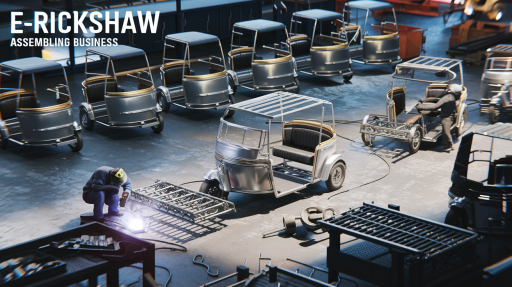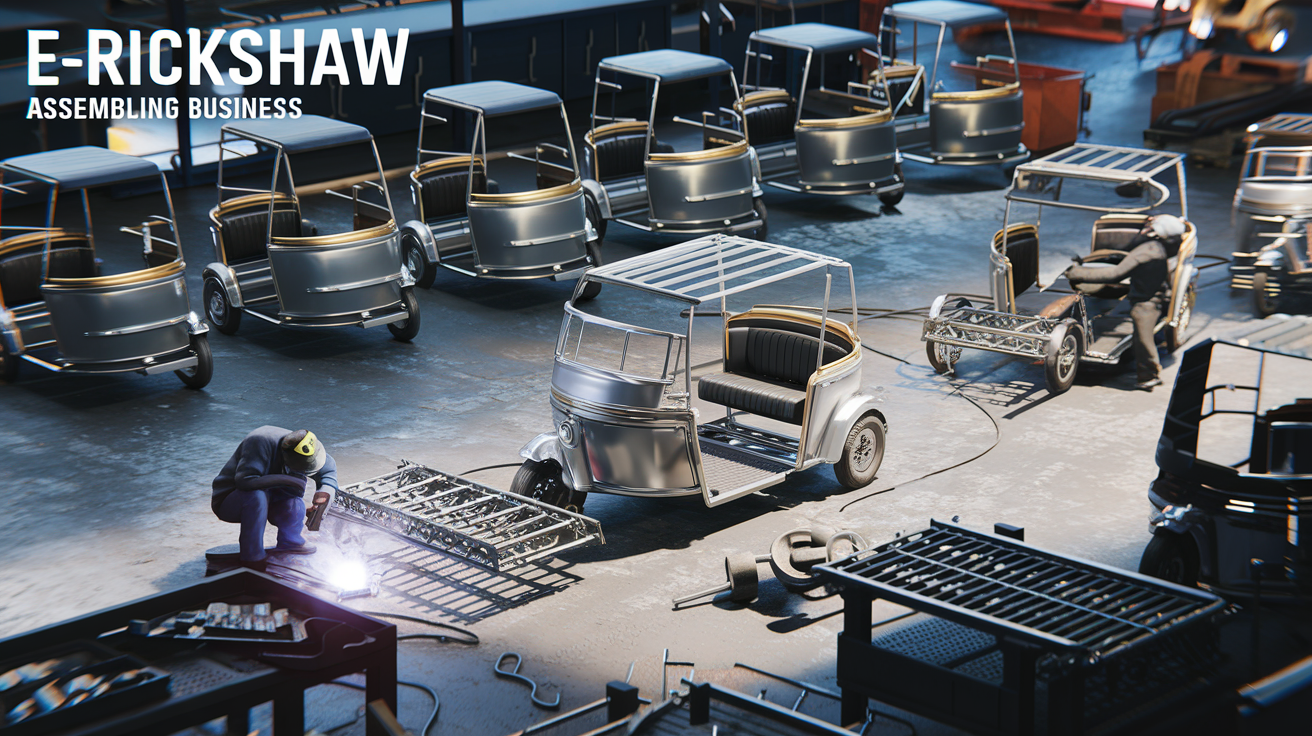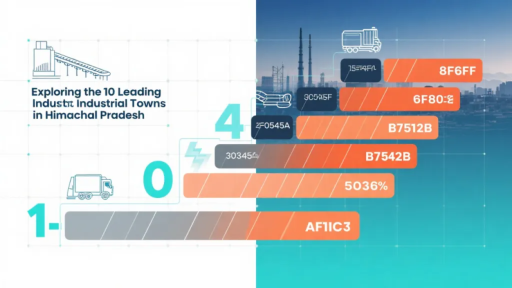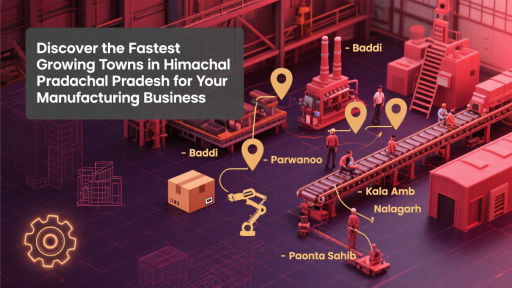isIntroduction
In recent years, the electric vehicle industry, along with e-rickshaw production, has exhibited strong market expansion in India. The market develops due to rising consumer needs for reasonable green transportation alternatives. The introduction outlines a thorough data-based method that assists businesses in establishing successful e-rickshaw assembly operations.
Market Analysis
The Indian e-rickshaw market held a value of $291.9 million in 2023, and it is predicted to reach $463.9 million by 2030 with a 7% compound annual growth rate (CAGR). The market expansion provides remarkable business prospects for people who want to start new ventures.
The market for e-rickshaws in India is substantial because urban locations demonstrate high demand for environmentally friendly, low-cost transportation. Government policies act as the main factor that drives this marketplace. The Indian government supports electric vehicle manufacturing through grants together with tax advantages and loan programmes having low interest rates. The regulatory framework eases financial obstacles which businesses encounter when they start operating in the e-rickshaw industry.
Also Read: How to Start a Manufacturing Business of E-Rickshaws
Starting the Business
Market Research:
The market analysis should focus on identifying the regions where e-rickshaw demand is highest. E-rickshaws shall target market demand in cities from tier 2 and tier 3 categories because these areas maintain traditional rickshaw dominance while showing rising preference for emissions-free transportation vehicles. Before launching the business, it is crucial to examine local transportation requirements to determine which e-rickshaw features address those needs.
Business Plan
Create a detailed business plan. Your business plan needs to detail both the e-rickshaw distribution model between direct sales to operators and leasing services as well as the targeted market segments with corresponding financial projections and your growth expansion strategies.
Capital Requirements
One needs to provide considerable wealth to start an e-rickshaw assembling operation. The start-up requires funding for both land purchase in the 1,000–15,000 sq. ft. range together with assembly equipment and motors, batteries, frames to form the initial inventory and staffing with operational expenses. Funding requirements for starting an e-rickshaw assembly business will be between 25 lakhs and 50 lakhs Indian Rupees based on operational dimensions.
Facility Setup
After funding success, you must proceed with building your assembly facility. Place your facility inside an industrial area that provides quick access to parts distributors, also enabling you to maintain a reliable team of workers. The assembly facility space divides into three areas that include the production line and both inventory storage plus quality control examination sections.
Project Report: E-Rickshaw Assembling
Machinery and Equipment
Your business requires the combination of welding machinery and motor testers alongside battery chargers and assembly tools as main equipment. The price of this machinery falls between INR 10 lakhs and INR 20 lakhs according to production requirements.
Supplier Relationships
Your business should maintain supplier relationships with electric motor and lithium-ion battery producers along with controller manufacturers as well as frame developers and wheel manufacturers and electric component suppliers. Selection of premium components remains essential because it directly impacts the lifespan and operational competence of finished products. Home-based purchase of required components will help reduce overall costs.
Labor
Hiring skilled labour is crucial. Assembling your e-rickshaw requires qualified personnel who include electrical engineers and quality control inspectors next to assemblers and administrative support persons. Educational training sessions will help employees perform assembly duties effectively for e-rickshaws.
Legal Compliance:
You must complete two registrations with the Ministry of Corporate Affairs (MCA) together with necessary licences, including GST registration and MSME registration, along with certification for vehicle safety standards. All e-rickshaws operating in India require approval by the Bureau of Indian Standards (BIS) according to their safety and performance standards. Operation of your vehicles along with legal business sales requires this requirement to be fulfilled.
Marketing and Sales
The market entry requires a well-developed marketing strategy. Construct a branding strategy which appeals to environmentally friendly customers and transportation firms. Official marketing techniques which combine search engine optimisation with social media alongside traditional strategies that include flyers and trade shows can help drive lead generation. Establish connections with transport associations that will provide you with access to their member fleet owners.
After-Sales Service
After e-rickshaw assembly, a business must keep operating successfully. Providing after-sales service is essential to keep customers from leaving. The business should establish service facilities across major metropolitan areas and team up with external maintenance companies to support e-rickshaw maintenance needs. As a strategy to build lasting customer relationships, provide both spare parts and scheduled maintenance services.
Profitability of the Business
- The running expenses for e-rickshaws remain extensively lower than both conventional gasoline-powered cars and traditional rickshaws. An e-rickshaw operates at an average price of INR 0.40 for each kilometre travelled, whereas standard rickshaw rates fall between INR 2.10 and INR 2.30.
- Your profit margin from assembling e-rickshaws will normally fall between 15% and 20% based on operational scale and cost management success. Your profitability margin expands with the addition of new customers, and production capacity increases at different stages of your business growth.
- You can generate revenue in several ways. The business can either market e-rickshaws to fleet operators for direct purchase or provide operators a lease option that includes the opportunity to purchase after a specified time. The business generates income through spare parts sales combined with service maintenance agreements.
Government Support and Incentives
The government of India provides multiple economic benefits to enterprises that operate in the electric vehicle sector. Working under the Faster Adoption and Manufacturing of Hybrid and Electric Vehicles (FAME) scheme, businesses can acquire up to a 40% subsidy when manufacturing all kinds of electric vehicles, including e-rickshaws.
The government provides tax relief on buying components like batteries and motors, which results in substantial decreased costs of raw materials.
Challenges and Considerations
Supply Chain and Component Quality: One of the main challenges in the e-rickshaw assembling business is sourcing quality components. Your success depends on building relationships with dependable suppliers who ensure constant delivery of first-class batteries together with motors and additional components. All e-rickshaws need this element for safe operations because it contributes to their reliability.
Regulatory Hurdles: While the Indian government supports electric vehicle businesses, local regulations vary, and there might be hurdles related to permits, safety certifications, and environmental standards. Following regulatory updates will protect your business from legal troubles.
Competition: As the market grows, competition will intensify. An e-rickshaw company should specialise in building premium vehicles backed by comprehensive service assistance. The long-term achievement for your business requires consistent customer loyalty and solid brand reputation.
Conclusion
Starting an e-rickshaw assembling business in India offers significant potential for entrepreneurs, thanks to the growing demand for affordable, eco-friendly transport solutions. By following a structured approach—from market research and funding to facility setup and marketing—you can tap into this expanding market and build a profitable venture. While challenges like supply chain management and regulatory hurdles exist, the overall opportunities make the e-rickshaw assembling business a highly profitable one in the long run. With proper planning and execution, you can enter the market, differentiate your business, and establish a successful e-rickshaw assembly operation.






